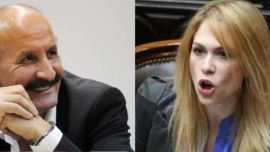Argentina needs a long-term plan to stabilise its battered economy and a decade-long program with the International Monetary Fund can help achieve that goal, according to one of the country’s main opposition leaders.
Former Buenos Aires Province governor María Eugenia Vidal, who is now running as national lawmaker for the country’s capital in November midterm elections, said the government of President Alberto Fernández needs to produce a big-picture economic road map that is sustained by whoever is in power beyond the end of his term in 2023.
Argentina has failed to address its economic challenges including annual inflation above 50 percent, increasing poverty and lack of investor credibility after three sovereign debt defaults this century alone. A record US$45-billion loan signed with the Fund during the previous administration of president Mauricio Macri did little to reverse the country’s recent history of financial instability.
Fernández’s government, which hasn’t outlined any explicit economic plan in its first two years in power, has also delayed reworking an agreement with the Fund to repay the loan. While the administration seeks a new programme that lasts 10 years to maximise the repayment period, it’s wary of the political costs of having the Washington organisation supervising the economy again after 21 plans since 1956.
“The IMF agreement has to detail a 10-year path and that path has to show how Argentina is going to take charge of its responsibilities – what spending commitments it will make and what revenue commitments is it going to have,” Vidal said in an interview. “The agreement with the IMF isn’t a deal to get by for another two years.”
Argentines take to the polls September 12 in a primary vote that will measure the political strength of the federal Peronist government and the opposition ahead of the midterm elections on November 14. The primary will determine whether Vidal or a former economy minister, Ricardo López Murphy, represent Juntos por el Cambio, the main opposition coalition, in its stronghold City of Buenos Aires.
Vidal shied away from tying specific conditions to support the IMF deal in Congress, as required by local law, if elected. The opposition coalition is against some of the government’s most unorthodox policies including a bulging public sector, money printing to finance the deficit and an anti-business bias, former economy minister Hernán Lacunza said during the same interview.
In June, Vidal held meetings alongside Lacunza in New York, seeking to revive interest among Wall Street investors that Juntos por el Cambio can return to power after Macri was defeated by Fernández in 2019 as Argentines sought a change following currency instability. If elected to Congress, she has a more immediate goal.
Her coalition “can win this election and has the ability to prevent the ruling coalition from holding a majority in Congress,” Vidal said, recalling conversations with investors. Juntos por el Cambio “wants an open economy, an economy with more investment and wants an IMF deal based on a sustainable plan.”
by Patrick Gillespie & Jorgelina do Rosario, Bloomberg



















Comments